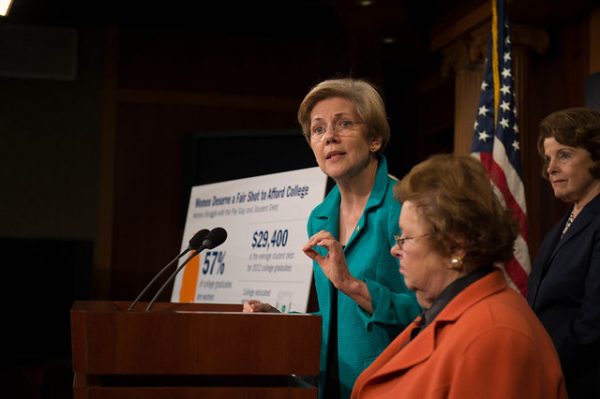
Elizabeth Warren released an ambitious plan for free college and student loan relief on April 22. Among a Democratic primary field that is increasingly embracing free college as the standard, Warren’s plan stood out for including $50,000 of debt relief for all individuals with current student debt, expanding what we mean by the cost of attendance, creating a fund for HBCUs, and (eventually) banning for-profit colleges from receiving federal funds. The plan also stood out in another way: centering sociological, justice-oriented research. Inequality and education are topics with a lot of good work from sociologists, but it is worth highlighting three sociologists who influenced Warren’s proposal: Louise Seamster, Tressie McMillan Cottom, and Sara Goldrick-Rab.
Warren notes that student loan debt is a racial equality issue. She specifically cites analysis done by a team at Brandeis University, including sociologist Louise Seamster, that finds that households with lower levels of education and families of color benefit more from Warren’s plan. Dr. Seamster’s recent article in Contexts, “Black Debt, White Debt,” demonstrates how debt often functions differently for black and white families. White Americans can take advantage of forms of debt like home mortgages, student loans, and business loans that later result in increased wealth and can be used to establish creditworthiness for future financial interactions. In contrast, municipals fines and fees or predatory student loans are more likely to be carried by black Americans. These forms of debt have high interest rates, poor terms, and hurt future wealth and creditworthiness more than they help.
- Louise Seamster. 2019. “Black Debt, White Debt.” Contexts 18(1): 30–35.
- Louise Seamster and Raphaël Charron-Chénier. 2017. “Predatory Inclusion and Education Debt: Rethinking the Racial Wealth Gap.” Social Currents 4(3): 199–207.
Tressie McMillan Cottom’s Lower Ed also highlighted disparate impacts of student loan debt on black Americans, as well as the centrality of inequality for the American economy and the effects of for-profit colleges. Her work demonstrates how for-profit colleges target low-income students and students of color Dr. Cottom has also testified in front of Congress on for-profit colleges and the reauthorization of the Higher Education Act.
- Tressie McMillan Cottom. 2017. Lower Ed: The Troubling Rise of For-Profit Colleges in the New Economy. New York: The New Press.
Warren’s free-college-for-all position leans heavily on researchers such as Sara Goldrick-Rab, one of the most active scholars and advocates for low-income college students. Dr. Goldrick-Rab advocates for meeting the basic needs of students as they pursue their education, especially in recognizing the costs beyond tuition that students face. Paying the Price demonstrates how it is money, not will or desire, that gets in the way of students on financial aid trying to finish a degree.
- Sara Goldrick-Rab. 2016. Paying the Price: College Costs, Financial Aid, and the Betrayal of the American Dream. Chicago, IL: University of Chicago Press.
Louise Seamster, Tressie McMillan Cottom, and Sara Goldrick-Rab are exemplars of how sociological research can shape public policy and of how research and activism can push for a more equitable world.

Comments